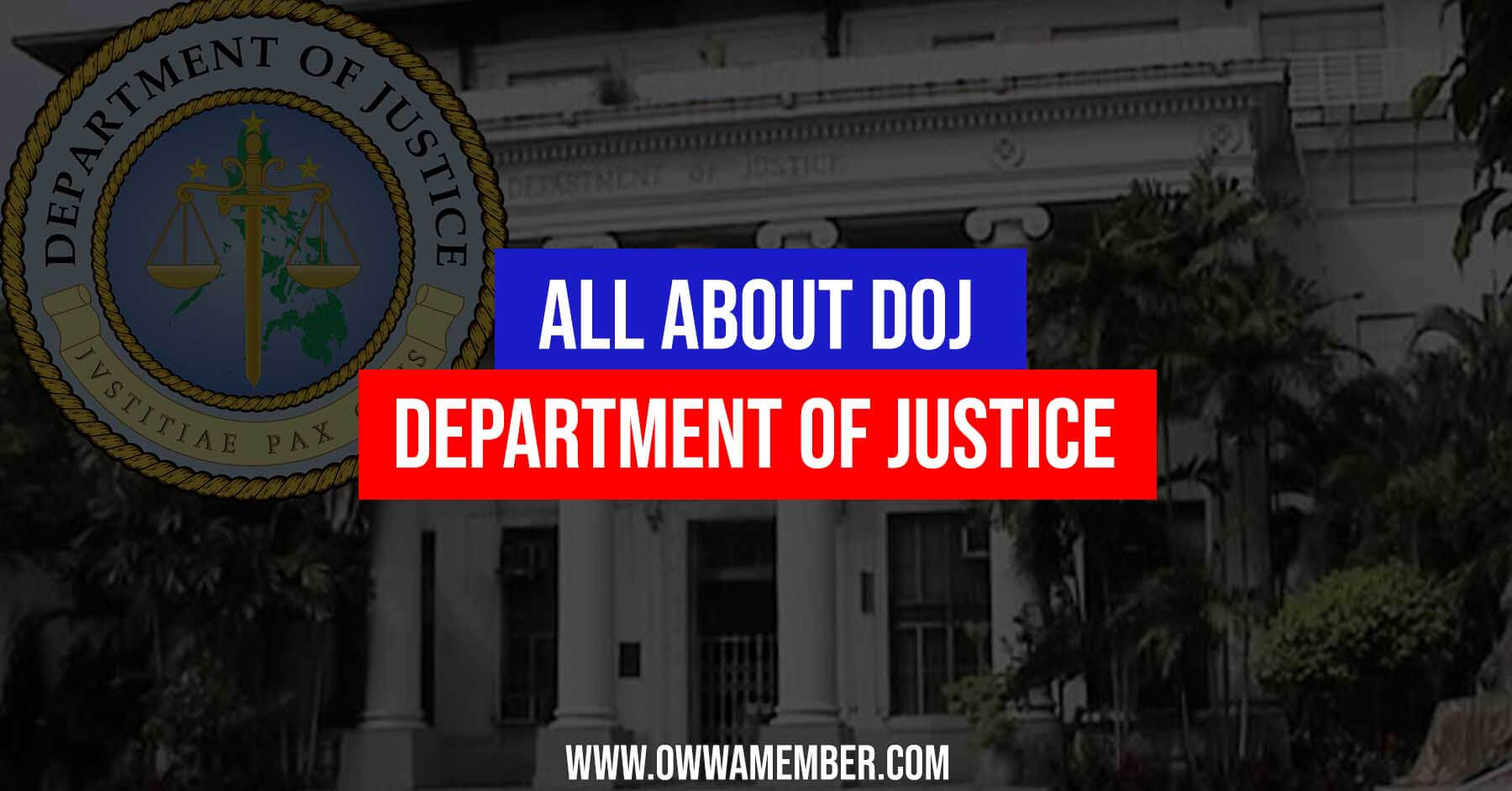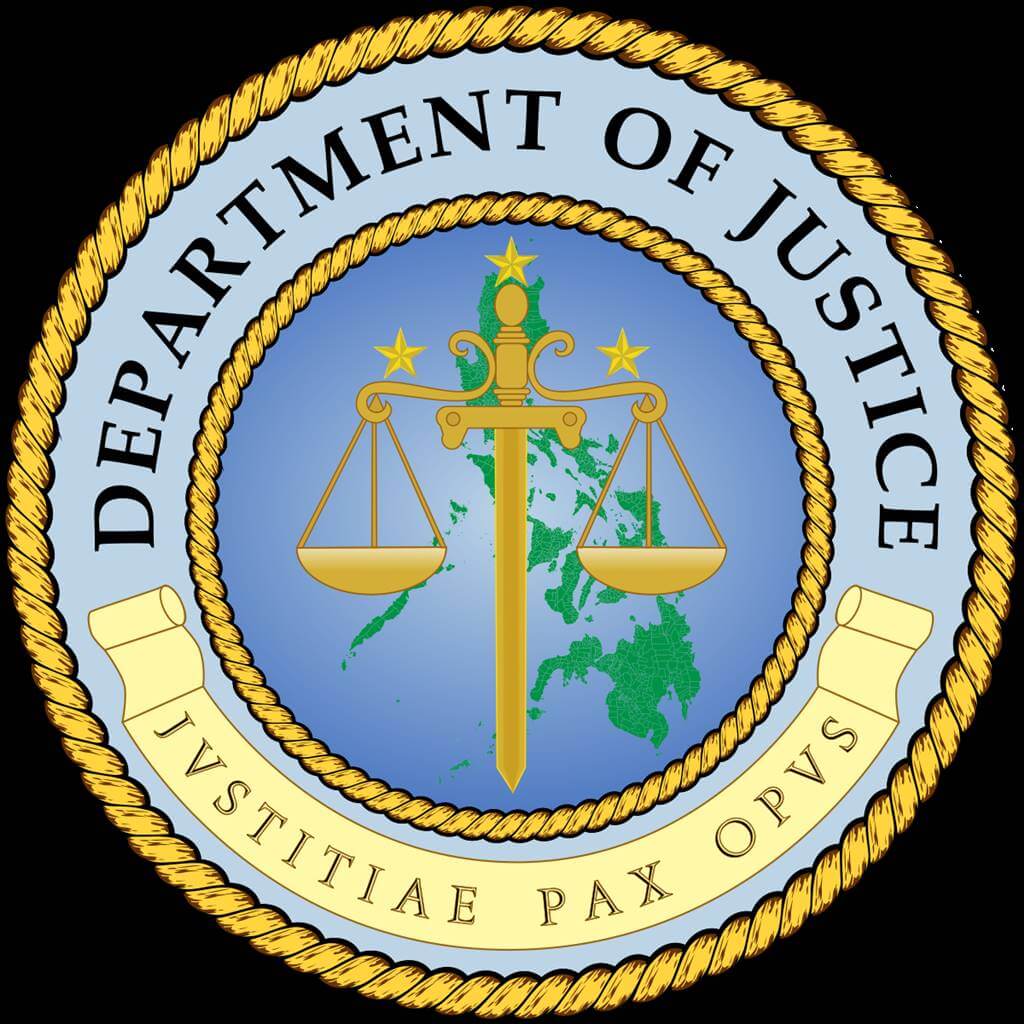The executive department of the Philippine government is responsible for the Department of Justice (DOJ), which is in charge of preserving the rule of law in the country. It serves as the government’s main legal department and prosecutorial office. Its main office is located at the DOJ Building in Padre Faura Street, Ermita, Manila, Philippines.
To learn more about the DOJ, keep reading the article.
Contents
- What is Department of Justice (DOJ)?
- Agencies Under DOJ
- Programs
- Administrative Order No. 35
- Child Protection Program (CPP)
- Criminal Code Committee (CCC)
- DOJ Action Center (DOJAC)
- Inter-Agency Council Against Trafficking (IACAT)
- Office of Cybercrime
- Office for Competition
- Justice Sector Coordinating Council (JSCC)
- Justice System Infrastructure Program (JUSIP)
- Katarungan Village Housing Project
- Library Webpage
- National Justice Information System (NJIS)
- Philippines Development Forum
- UN Joint Programme
- Victims Compensation Program
- Witness Protection, Security and Benefit Program
- Video: DOJ may libreng legal assistance | Newsroom Ngayon
- Frequently Asked Question
- 3. Where can I apply for DOJ assistance?
- Summary

What is Department of Justice (DOJ)?
The Department of Justice, which acts as the country’s legal counsel and prosecutorial office, was designated as the Republic of the Philippines’ top law enforcement agency. It protects the rule of law and makes sure that justice is administered fairly and effectively. With its current motto of “Justice for All,” the DOJ continues to pursue its main objective of “To Uphold the Rule of Law.”
Agencies Under DOJ
The following are the agencies under DOJ:
- Bureau of Corrections
- Bureau of Immigration
- Land Registration Authority
- Office For Alternative Dispute Resolution
- Office of the Government Corporate Counsel
- Office of the Solicitor General
- National Bureau of Investigation
- Parole and Probation Administration
- Presidential Commission on Good Government
- Public Attorney’s Office

Programs
Listed below are the programs administered by DOJ:
Administrative Order No. 35
Administrative Order No. 35 (series of 2012) established the Inter-Agency Committee (IAC) On Extra-Legal Killings, Enforced Disappearances, Torture and Other Grave Violations of the Right to Life, Liberty and Security of Persons.
It was established to act as the government’s legal framework for resolving unsolved cases of political violence, including extralegal killings (ELK), enforced disappearances (ED), torture, and other serious abuses of a person’s right to life, liberty, and security.
Child Protection Program (CPP)
The Child Protection Program Committee (CSPC) is now strengthened and reorganized to more efficiently serve as the main organization in charge of organizing and overseeing the investigation and prosecution of cases involving violations of R.A. No. 7610 and other serious legislation about children.
Criminal Code Committee (CCC)
The Department of Justice established the Criminal Code Committee (CCC) following His Excellency’s 2010 order to review current laws to guarantee consistency. The purpose of this inter-agency organization is to gather criminal justice stakeholders to evaluate all current criminal legislation in the country and to develop a simple, up-to-date, and natural Criminal Code of the Philippines.
Representatives from the executive, legislative, and judicial departments of government constitute the CCC, which is funded by the German Hanns Seidel Foundation. The CCC evaluates the principles of the two major legal traditions of common law and civil law through monthly meetings, consultations with stakeholders from all sectors, in-depth research, and international exchanges. It also draws from best practices around the world.
DOJ Action Center (DOJAC)
The Department of Justice Action Center responds to complaints, requests for legal assistance, and inquiries from walk-in clients as well as those made over the phone. Every region of the country has the DOJ Action Center (DOJAC) established and operating. The regional DOJACs were administered by representatives of the Public Attorney’s Office and the National Prosecution Service.
Inter-Agency Council Against Trafficking (IACAT)
The Republic Act No. 9208, also known as the Anti-Trafficking in Persons Act of 2003, established the Inter-Agency Council Against Trafficking (IACAT), which has the legal responsibility to oversee and coordinate the execution of the law.
The IACAT carries out a wide range of projects aimed at eliminating human trafficking in the Philippines, preventing it from happening again, protecting and rehabilitating victims, and bringing traffickers to justice.
Office of Cybercrime
The Office of Cybercrime (OOC) was established within the DOJ by Republic Act No. 10175, also known as the Cybercrime Prevention Act of 2012, which also named it the Central Authority in all matters about extradition and international assistance for cybercrime and cyber-related concerns.
It also serves as the main agency for developing and putting into practice plans for criminal investigations and prosecutions aimed at reducing cybercrime and related offenses across the country.
Office for Competition
All criminal violations resulting from the PCA and other competition-related statutes are subject to preliminary investigation and prosecution under the PCA by the DOJ-OFC.
The Proposed Rules establish a framework for carrying out the PCA’s criminal provisions, as well as guidelines for the preliminary investigation and prosecution of competition cases and the granting of witness immunity under the Leniency Program run by the DOJ-OFC.
Other Programs of DOJ
Justice Sector Coordinating Council (JSCC)
Justice sector agencies are joint together in support of the effective and efficient administration of justice.
The JSCS coordinate approach to justice sector policy development, planning, and operations to ensure a sectoral approach to justice administration that is both coherent and successful.
Justice System Infrastructure Program (JUSIP)
Through Administrative Order No. 99, at the time Corazon C. Aquino ordered that a program be started for the construction and/or rehabilitation of the court buildings and offices of the Prosecutors, Public Attorneys, and Parole and Probation Officers. At the time, there was a severe shortage of buildings, offices, and other facilities assigned to those who run the justice system. Through Administrative Order No. 11, President Fidel V. Ramos authorized the Deeds in Justice System Infrastructure Program (JUSIP) in September 1992. The program aims to offer judges’ quarters and appropriate courthouses.
Katarungan Village Housing Project
The Katarungan Village Housing Project was established by Proclamations No. 792 and No. 120, dated September 5, 1991, and December 15, 1992. This project changes a portion of the New Bilibid Prison’s grounds into housing projects for the DOJ.
Library Webpage
For the benefit of those who work for the DOJ, the Library aims to provide sufficient amounts of current reading materials in both print and digital formats. The best service delivery is anticipated to be accomplished with such materials being accessible and organized well.
National Justice Information System (NJIS)
The National Justice Information System (NJIS) is an ICT-based tool designed to make it easier for law enforcement and justice sector agencies to manage and share important data as they carry out their statutorily necessary public functions. The Courts Cluster, which is represented and commanded by the Supreme Court, is currently being integrated into NJIS.
The NJIS is an important component of the DOJ’s approved information systems strategic plans and is supported by the yearly General Appropriations Act.
Philippines Development Forum
Pursuing our social contract with the Filipino people through the rearrangement of the cabinet clusters was established by Executive Order No. 43.
The rule of law is a principle of government in which all individuals, institutions, and entities, both public and private, including the State itself, are held accountable to laws that are publicly promulgated, equally enforced, independently decided upon, and consistent with international human rights norms and standards.
UN Joint Programme
For this UN Joint Programme, the UN will assemble financial support from numerous development partners. The UN Charter and the UN Human Rights Due Diligence Policy for support to non-UN Security Forces will both serve as guiding principles for the UN Joint Programme.
The Philippines’ international human rights duties and domestic laws supporting them will be promoted by the UN Joint Programme.
Victims Compensation Program
Republic Act No. 7309 is the law that established the Board of Claims under the DOJ, which provides compensation for victims of violent crimes and unlawful imprisonment or detention.
A person who was wrongfully detained and released without being charged, as defined in the Revised Penal Code, under a final judgment of the court, or who is a victim of a violent crime, including rape and offenses committed with malice that resulted in death or serious physical an injury, may file a claim. A person may also file a claim if they were unjustly accused, convicted, and imprisoned before being released by virtue of a judgment of acquit
Witness Protection, Security and Benefit Program
It is a program established by Republic Act No. 6981, “The Witness Protection, Security and Benefit Act,” that aims to encourage someone who has seen or heard about a crime to testify in front of a court, quasi-judicial body, or an investigating authority by protecting them from retaliation and financial hardship.
Any person who has knowledge of or information regarding the commission of a crime and has testified, is testifying, or is willing to testify, witness in a congressional investigation, may be admitted to the program with the approval of the legislative committee where his testimony is needed and the Senate President or Speaker of the House of Representatives, as applicable. A witness who participated in the commission of a crime and who desires to remain anonymous may also be admitted to the program.
Video: DOJ may libreng legal assistance | Newsroom Ngayon
Watch the CNN Philippines video as they explain the programs given by the Department of Justice (DOJ), the qualifications for applying, and the requirements
Frequently Asked Question
If you have any further questions regarding “Department of Justice (DOJ)”, see the list of frequently asked questions and answers below.
1. What is the DOJ?
The DOJ is the main legal agency of the country. The DOJ manages the criminal justice system for the government by conducting investigations into crimes, prosecuting offenders, and keeping an eye on the prison system.
2. What is the purpose of DOJ?
DOJ administers justice in a fair, effective, and efficient manner. They aim to ensure that everyone has access to justice on an equal basis, to properly protect constitutional rights, and to guarantee that no one is denied due process of law.
3. Where can I apply for DOJ assistance?
You can directly visit the DOJ’s office or inquire thru email.
4. What is the DOJs hotline number?
You can reach DOJ’s main office at (+632) 8523 8481 to 98.
5. What is DOJ’s main office address?
DOJ’s address is at Padre Faura Street Ermita, Manila 1000 Republic of the Philippines.
6. What is DOJ’s email address?
DOJ’s email address is dojac@doj.gov.ph.
Summary
DOJ provides to every Filipino an effective, efficient, and equitable administration of justice. It is simpler to get assistance from the DOJ by submitting inquiries to dojac@doj.gov.ph or by going to the main office at Padre Faura Street Ermita, Manila 1000 Republic of the Philippines.